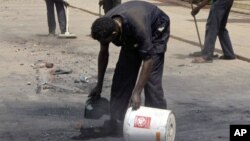The U.N. human rights chief has called on authorities in Sudan not to use violence and mass arrests against anti-government protests planned for Friday in the capital, Khartoum.
Navi Pillay, the U.N. high commissioner for human rights, said dozens of journalists, activists, and others have been arrested since student protests against government austerity measures began June 17.
Since then, small protests have spread throughout the country, drawing an increasingly harsh response from Sudanese security forces. Tear gas, rubber bullets, and live ammunition have been used against protesters, in what Pillay described as "heavy-handed suppression."
Activists are calling for citizens to take to the streets following afternoon prayers Friday in what has been dubbed the "Day of Elbow-Licking." The name is a play on an expression used by government officials to dismiss the possibility of an "Arab Spring" type protest.
An anti-government group known as GIRIFNA has listed a series of demands for Friday's protest, including the resignation of the government and the release of political prisoners.
The U.S. Embassy in Khartoum is warning American citizens in Sudan to exercise caution. It said in a statement Friday that U.S. citizens should avoid crowds or demonstrations, warning they could become confrontational or turn violent.
Earlier this week, the U.S. State Department condemned Sudan's response to the protests. Spokesperson Victoria Nuland said there have been reports of protesters being "beaten, imprisoned and severely mistreated while in government custody."
Sudanese President Omar al-Bashir has dismissed the protests as the work of a few isolated agitators and vowed to continue with the government's planned spending cuts.
Navi Pillay, the U.N. high commissioner for human rights, said dozens of journalists, activists, and others have been arrested since student protests against government austerity measures began June 17.
Since then, small protests have spread throughout the country, drawing an increasingly harsh response from Sudanese security forces. Tear gas, rubber bullets, and live ammunition have been used against protesters, in what Pillay described as "heavy-handed suppression."
Activists are calling for citizens to take to the streets following afternoon prayers Friday in what has been dubbed the "Day of Elbow-Licking." The name is a play on an expression used by government officials to dismiss the possibility of an "Arab Spring" type protest.
An anti-government group known as GIRIFNA has listed a series of demands for Friday's protest, including the resignation of the government and the release of political prisoners.
The U.S. Embassy in Khartoum is warning American citizens in Sudan to exercise caution. It said in a statement Friday that U.S. citizens should avoid crowds or demonstrations, warning they could become confrontational or turn violent.
Earlier this week, the U.S. State Department condemned Sudan's response to the protests. Spokesperson Victoria Nuland said there have been reports of protesters being "beaten, imprisoned and severely mistreated while in government custody."
Sudanese President Omar al-Bashir has dismissed the protests as the work of a few isolated agitators and vowed to continue with the government's planned spending cuts.





